Atlantā lems par NCAA noteikumu maiņu
Otrdien, 12. janvārī, Džordžijas lielpilsētā Atlantā sāksies ASV Nacionālās studentu sporta asociācijas (NCAA) konvents, kurā lems par organizācijas noteikumu maiņu, tajā skaitā par atļauju ārzemju studentiem pirms studiju uzsākšanas spēlēt profesionālās komandās.
NCAA Pirmās divīzijas (The Division I) Likumdošanas padomei būs jāizskata gandrīz 100 priekšlikumu, kurus rosinājušas dažādas NCAA komitejas un 30 reģionālās sporta konferences
Padome lems, vai ārzemju sportisti, kuri pirms došanās uz ASV spēlējuši profesionālās komandās, varēs piedalīties NCAA sacensībās. Jāuzsver, ka atļauja attiecas uz sportistiem, kuri par spēlēšanu nesaņem naudu un citus materiālus labumus. Klubi sedz viņu dalībai nepieciešamos un aktuālos izdevumus, bet nemaksā algu. Izmaiņas attiecināmas uz visiem sporta veidiem NCAA pirmajā divīzijā, izņemot vīriešu hokeju.
Par ārzemniekiem NCAA
ASV universitāšu sporta programmu straujā attīstība un piedāvātās iespējas vilina daudzus. Desmit gadu laikā ārzemju studentu skaits NCAA trīskāršojās un pārsniedza desmit tūkstošus. Tagad ārzemnieki veido 6,2% sportistu NCAA pirmajā divīzijā, kamēr valstī kopumā citvalstnieki sasniedz 2,1% no studentu skaita.
Šobrīd sportisti var zaudēt amatiera statusu, vienkārši spēlējot kopā ar kolēģiem, kuri saņēmuši „vairāk par aktuālajiem un nepieciešamajiem izdevumiem” no kluba. „Viens sportists „padara par profesionāļiem” visus komandas biedrus,” saka Maikls Rodžerss (Rogers), NCAA pirmās divīzijas Amatieru pārvaldes vadītājs un Beilora tiesību zinātņu skolas profesors. „Veidojas kopēja pārliecība, ka šāds standarts ir negodīgs. Tas jāmaina un šogad to cenšamies panākt.”
Esošā sistēma rada arvien lielāku neapmierinātību un to pamanījusi NCAA vadība. 2009. gada jūnijā Rodžerss saņēma treneru asociāciju atbalstu komitejas priekšlikumam atvērt studentu sporta iespējas kandidātiem, kuri nāk no klubiem ar profesionāliem sportistiem, bet paši algas nesaņem.
Priekšlikumu izvērtē NCAA vēlētās amatpersonas, kuru vidū noteicošā loma ir treneru asociācijām. Tenisa, volejbola un amerikāņu futbola apvienības jau signalizējušas par atbalstu vai nav izrādījušas satraukumu, iebilst hokejisti. Apstiprināšanas gadījumā jaunie noteikumi stāsies spēkā 2010. gada augustā.
Attieksme pret ārzemniekiem ir aktuāla sporta veidos, kuri guvuši plašu starptautisku izplatību. Atšķirībā no ASV, vairumā valstu nav studentu vai vidusskolu sporta sistēmas. Daudzsološi atlēti aug klubos, kuri atbalsta komandas no jaunatnes līdz senioru līmenim. Klubi apmaksā izdevumus un dažreiz algas, bet amatieri bieži spēlē kopā ar profesionāļiem.
Izmantotie resursi:
NCAA
Ierosinātie labojumi amatieru statusā
Intent: In sports other than men's ice hockey, to specify that prior to initial full-time collegiate
enrollment, an individual may enter into an agreement to compete on a professional team and
compete on a professional team, provided the agreement does not guarantee or promise payment
(at any time) in excess of actual and necessary expenses to participate on the team; further, in
sports other than men's ice hockey, tennis, swimming and diving and women's volleyball, to
specify that a student-athlete who does not initially enroll full-time in a collegiate institution within
one year (six months for tennis) or the next opportunity to enroll following the high school
graduation date of the prospective student-athlete's class and participates in organized events
after the specified time period shall be charged with a season of intercollegiate competition for
each year of participation and shall fulfill an academic year in residence (one year for each year of
competition in tennis) on matriculation at the certifying institution before being eligible to represent
the institution in intercollegiate competition.
A. Bylaws: Amend 12.1.2, as follows:
12.1.2 Amateur Status. An individual loses amateur status and thus shall not be eligible for
intercollegiate competition in a particular sport if the individual:
Page 32 of 185
Date Printed: December 15, 2009
12.1.2-(a) through 12.1.2-(b) unchanged.
(c) Signs a contract or commitment of any kind to play professional athletics, regardless of its
legal enforceability or any consideration received, except as permitted in Bylaw 12.2.5.1;
12.1.2-(d) unchanged.
(e) Competes on any professional athletics team per Bylaw 12.02.4, even if no pay or
remuneration for expenses was received, except as permitted in Bylaw 12.2.3.2.1;
Remainder of 12.1.2 unchanged.
B. Bylaws: Amend 12.2.3.2, as follows:
12.2.3.2 Competition with Professionals. An individual shall not be eligible for intercollegiate
athletics in a sport if the individual ever competed on a professional team (per Bylaw 12.02.4) in
that sport. However, an individual may compete on a tennis, golf, two-person sand volleyball or
two-person synchronized diving team with persons who are competing for cash or a comparable
prize, provided the individual does not receive payment of any kind for such participation.
12.2.3.2.1 Exception—Competition Prior to Initial Full-Time Collegiate Enrollment --
Sports Other Than Men's Ice Hockey. In sports other than men's ice hockey, prior to
initial full-time collegiate enrollment, an individual may compete on a professional team
(per Bylaw 12.02.4), provided he or she does not receive more than actual and necessary
expenses to participate on the team.
12.2.3.2.1 through 12.2.3.2.4 renumbered as 12.2.3.2.2 through 12.2.3.2.5
C. Bylaws: Amend 12.2.5, as follows:
12.2.5 Contracts and Compensation. An individual shall be ineligible for participation in an
intercollegiate sport if he or she has entered into any kind of agreement to compete in
professional athletics, either orally or in writing, regardless of the legal enforceability of that
agreement.
12.2.5.1 Exception—Prior to Initial Full-Time Collegiate Enrollment—Sports Other Than
Men's Ice Hockey. In sports other than men's ice hockey, prior to initial full-time
collegiate enrollment, an individual may enter into an agreement to compete on a
professional team (per Bylaw 12.02.4), provided the agreement does not guarantee or
promise payment (at any time) in excess of actual and necessary expenses to participate
on the team.
12.2.5.1 renumbered as 12.2.5.2
D. Bylaws: Amend 14.02, as follows:
14.02 DEFINITIONS AND APPLICATIONS
14.02.1 through 14.02.8 unchanged.
14.02.9 Organized Competition. Athletics competition shall be considered organized if
any one of the following conditions exists:
(a) Competition is scheduled and publicized in advance;
Page 33 of 185
Date Printed: December 15, 2009
(b) Official score is kept;
(c) Individual or team standings are maintained;
(d) Official timer or game officials are used;
(e) Admission is charged;
(f) Teams are regularly formed or team rosters are predetermined;
(g) Team uniforms are used;
(h) A team in privately or commercially sponsored; or
(i) The competition is either directly or indirectly sponsored, promoted or administered
by an individual, an organization or any other agency.
14.02.9 through 14.02.13 renumbered as 14.02.10 through 14.02.14
E. Bylaws: Amend 14.2.3, as follows:
14.2.3 Criteria for Determining Season of Competition.
14.2.3.1 unchanged.
14.2.3.2 Delayed Enrollment—Seasons of Competition.
14.2.3.2.1 Sports Other Than Men's Ice Hockey and Tennis, Swimming and Diving and
Women's Volleyball. A In sports other than men's ice hockey and tennis, a student-athlete
who does not enroll in a collegiate institution as a full-time student in a regular academic term
during a one-year time period after this or her high school graduation date or the graduation
date of his or her class (as determined by the first year of high school enrollment or the
international equivalent as specified in the NCAA Guide to International Academic Standards
for Athletics Eligibility and based on the prescribed educational path in the student-athlete's
country), whichever occurs earlier, shall be subject to the following:
(a) The student-athlete shall be charged with a season of intercollegiate eligibility for each
calendar year after the one-year time period (the next opportunity to enroll after one calendar
year has elapsed) and prior to full-time collegiate enrollment during which the student-athlete
has participated in organized events competition per Bylaw 14.2.3.5.3 14.02.9.
(b) After the one-year time period, if the student-athlete has engaged in events competition
per Bylaw 14.2.3.5.3 14.02.9, on matriculation at the certifying institution, the student-athlete
must fulfill an academic year in residence before being eligible to represent the institution in
intercollegiate competition.
14.2.3.2.2 Tennis. In tennis, a student-athlete who does not enroll in a collegiate
institution as a full-time student in a regular academic term within six months (or the
first opportunity to enroll after six months have elapsed) after his or her high school
graduation date or the graduation date of his or her class (as determined by the first
year of high school enrollment or the international equivalent as specified in the NCAA
Guide to International Academic Standards for Athletics Eligibility and based on the
prescribed educational path in the student-athlete's country), whichever occurs earlier,
shall be subject to the following:
(a) The student-athlete shall be charged with a season of intercollegiate eligibility for
each calendar year after the six-month period has elapsed (or the next opportunity to
enroll) and prior to full-time collegiate enrollment during which the student-athlete has
participated in organized competition per Bylaw 14.02.9.
(b) After the six-month period, if the student-athlete has engaged in organized
competition per Bylaw 14.02.9, on matriculation at the certifying institution, the studentathlete
must fulfill an academic year in residence for each calendar year after the sixmonth
period has elapsed (or the next opportunity to enroll) and prior to full-time
collegiate enrollment during which the student-athlete has participated in such
competition before being eligible to represent the institution in intercollegiate
competition.
14.2.3.2.2.1 Matriculation After 20th Birthday—Tennis. In tennis, a student who is eligible
under Bylaw 14.2.3.2.2, but who participates in organized tennis events after his or her 20th
birthday and before full-time enrollment at the certifying institution shall be subject to the
following:
(a) The student will be charged with one season of intercollegiate tennis competition for each
calendar year after his or her 20th birthday and prior to full-time enrollment at the certifying
institution during which the student-athlete has participated in organized tennis events
competition per Bylaw 14.2.3.5.3 14.02.9. Note: This includes participation in
intercollegiate tennis while enrolled full time in another two-year or four-year institution;
however
(b) Upon matriculation at the certifying institution, the student-athlete must fulfill an academic
year in residence before being eligible to represent the institution in intercollegiate tennis,
unless the student transfers to the certifying institution with a minimum of 24 semester hours
(or equivalent) of transferable degree credit. (Note: All other NCAA transfer and academic
eligibility requirements apply.)
14.2.3.2.23 Exception—Olympic Games, Pan American Games, World Championships, World
Cup and World University Games Participation. Participation in the Olympic Games, Pan
American Games, World Championships, World Cup and World University Games is exempt
from application of Bylaws Bylaw 14.2.3.2 and 14.2.3.2.1.
14.2.3.3 through 14.2.3.4 unchanged.
14.2.3.5 Participation After 21st Birthday—Men's Ice Hockey. In sports other than tennis,
swimming and diving and women's volleyball men's ice hockey, any participation as an
individual or a team representative in organized sports competition by a student during each 12
month period after the student's 21st birthday and prior to initial full-time enrollment in a
collegiate institution shall count as one year of varsity competition in that sport. Participation in
organized competition during time spent in the U.S. armed services shall be expected. (Note:
In swimming and diving, and women's volleyball, Bylaw 14.2.3.5 applies to a student-athlete
who is not subject to Bylaw 14.2.3.2. If a student-athlete triggers both Bylaws 14.2.3.2 and
14.2.3.5, only Bylaw 14.2.3.2 applies.)
14.2.3.5.1 Track and Field and Cross Country. A prospective student-athlete who participates
in outside competition after the student's 21st birthday and prior to initial full-time enrollment in
a collegiate institution during a cross country, indoor track and field or outdoor track and field
sports season (as opposed to general road racing events) would be charged with at least one
season of competition in the sport in which the student participated.\
14.2.3.5.2 Road Racing. A prospective student-athlete who participates in road racing
activities after the student's 21st birthday and prior to initial full-time enrollment in a collegiate
institution shall be charged with at least one season of competition in each of the sports of
cross country, indoor track and field and outdoor track and field.
14.2.3.5.3 Organized Competition. Athletics competition shall be considered organized if any
one of the following conditions exists:
(a) Competition is scheduled and publicized in advance;
(b) Official score is kept;
(c) Individual or tam standings are maintained;
(d) Official timer or game officials are used;
(e) Admission is charged;
(f) Teams are regularly formed or team rosters are predetermined;
(g) Team uniforms are used;
(h) A team is privately or commercially sponsored; or
(i) The competition is either directly or indirectly sponsored, promoted or administered by an
individual, an organization or any other agency.
14.2.3.6 unchanged.
Source: NCAA Division I Amateurism Cabinet
Effective Date: August 1, 2010; applicable to student-athletes who initially enroll full time in a
collegiate institution on or after August 1, 2010
Category: Amendment
Topical Area: Amateurism
Rationale: Prior to initial collegiate enrollment, it is more equitable to determine eligibility based on
the circumstances as they relate to the individual prospective student-athlete, as opposed to his or
her teammates. This revision would alleviate the situation in which a prospective student-athlete's
eligibility is jeopardized due to a teammate receiving remuneration above actual and necessary
expenses, even though the prospective student-athlete may be unaware of this arrangement and
does not receive more than actual and necessary expenses for participation on the team. Under
this approach, an institution would no longer be required to determine whether a team is
considered professional. Instead, the focus would be on the individual's specific circumstances
and eligibility would be assessed using the threshold of receipt of more than actual and necessary
expenses. The competitive equity issues related to participation in organized competition would be
addressed by applying the delayed enrollment seasons of competition legislation, which currently
apply only to tennis, swimming and diving, and women's volleyball, to all sports other than men's
ice hockey. For tennis, the decrease in the length of time during which prospective student-athletes
may compete in organized tennis will place emphasis on the importance of academics and level
the playing field by ensuring relatively similar competitive opportunities prior to college.
After reviewing feedback from the men's ice hockey community, the Amateurism Cabinet agreed
that the legislative changes included in the proposal would be detrimental to men's ice hockey
prospective student-athletes, to Division I institutions that sponsor men's ice hockey and to the
performance of United States national teams. If the proposal were adopted with men's ice hockey
included, many more prospective student-athletes would likely elect to participate in Major Junior
A hockey prior to initial collegiate enrollment. They would likely jeopardize their eligibility status by
being influenced to accept more than actual and necessary expenses, to sign with an agent, or to
sign a professional contract. Further, participation in Major Junior A hockey would likely be
detrimental to prospective student-athletes' academic success given the demands of participation
in that league. In addition, it is very common for men's ice hockey prospective student-athletes to
compete in junior hockey for more than one year after high school graduation and before initial
collegiate enrollment. Positive Academic Progress Rates (APR) in the sport may be attributed to
the maturity level of incoming student-athletes and the fact that the those who elect not to
participate in Major Junior A hockey have a clear commitment to earning a college degree.
Estimated Budget Impact: Potential cost savings in amateurism certification process.
Impact on Student-Athlete's Time: None.
Position Statement(s)
Men's and Women's Skiing Committee: The committee opposes the proposal due to the potential
significant negative impact on skiing student-athletes. Currently, most prospective studentathletes
that take more than one year off after high school graduation are the very best in their
respective countries and almost always on their National Teams. These athletes are delaying
their college enrollment in hopes of Olympic or World Championship opportunities. The potential
impact of this legislation would be to have the very best young skiers across the world who have
taken that second year off from college enrollment lose one year of eligibility and also have to
fulfill a year of residence on enrollment. The reality of this would be a two year "side-track" for
those athletes who truly will make up the future of the sport (one year while they fulfill a year of
residence and the another year once their eligibility has expired and they are trying to finish their
degrees). The current 21st birthday rule allows the top athletes an extra year or two out of high
school to pursue those hopes without penalty. If they choose to delay enrollment past their 21st
birthdays they simply lose years of eligibility, but to also make them fulfill a year of residence
seems to be punishing them for pursing a dream. In fact, the individuals who do matriculate in
college and ski at the NCAA level are not sponsored athletes and their respective national
governing bodies expect them to pay for their athletic experiences while on the lower rungs of the
national team systems. Therefore, to also lose eligiblity would be a double punishment.
History:
Jun 22, 2009 Submit; Submitted for consideration.
Jun 23, 2009 Amateurism Cabinet, Sponsored
Sep 25, 2009 Amateurism Cabinet, Modified the Proposal Modified to exclude men's ice
hockey from its application.
Oct 16, 2009 Men's and Women's Skiing Committee, Recommends Defeat

 @MarisNoviks
@MarisNoviks
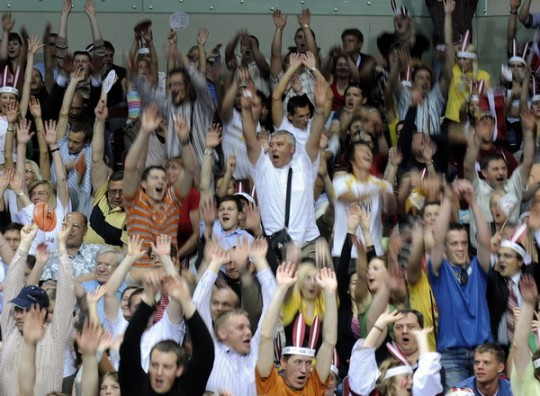












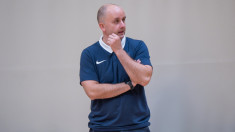
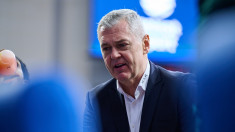

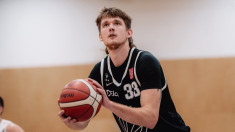

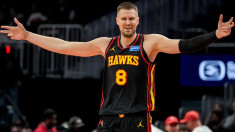

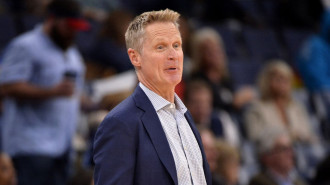

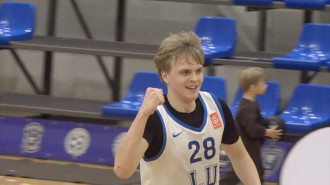
+7 [+] [-]
+3 [+] [-]
+2 [+] [-]
+3 [+] [-]
...hmm.. nu es arī apmulsu ieraugot ka rīt jau 14tais
+3 [+] [-]
+2 [+] [-]
+3 [+] [-]
Raksta cena: 2Ls
Rakstā ir 9543 vārdi
[+] [-]
[+] [-]
padoms - nemelot vismaz sev